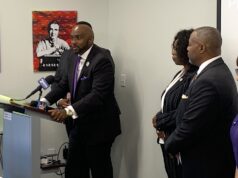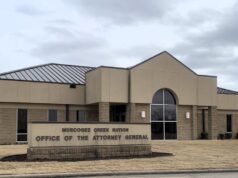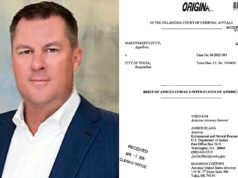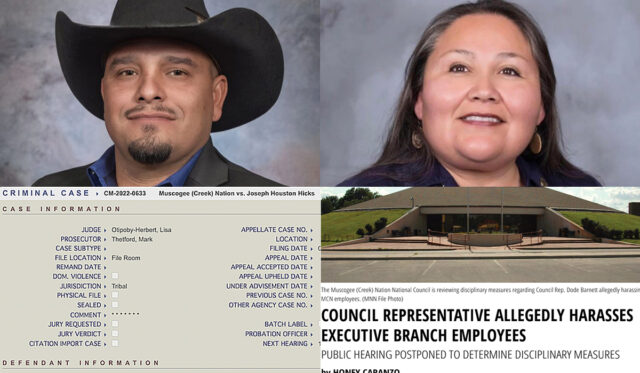

As Muscogee Nation Tribal Council Rep. Joseph Hicks approaches the finish line in his reelection effort against challenger Dode Barnett on Saturday, he is also preparing for a Muscogee Nation District Court hearing Monday that could result in one of his two DUI offenses being accelerated to a felony.
Hicks did not initially respond to NonDoc’s requests for an interview ahead of the tribe’s Nov. 4 general election, but after the publication of an article featuring remarks from Barnett on Oct. 19, Hicks asked to conduct an interview after all.
“I’ve always wanted to help people,” said Hicks, 43, during an interview Friday. “Just about anything I’ve ever done, it’s always been to where I can help others.”
Hicks’ two misdemeanor DUI plea agreements — stemming from arrests about 14 months apart — have drawn questions during his reelection campaign, largely owing to Muscogee Nation code that implies Hicks’ second DUI case should have netted a felony.
According to reporting from Mvskoke Media, Hicks pleaded no contest to a misdemeanor DUI in September 2022, then another misdemeanor DUI in July 2023 while he was on probation for the first offense. According to MCN code, any person convicted of a second DUI offense “shall be deemed guilty of a felony.” According to Muscogee County District Court records, the hearing set for 1:30 p.m. Monday involves Hicks’ first DUI conviction, which could be accelerated to a felony owing to his second case.
Asked Thursday about the hearing, Hicks believes it could be politically motivated.
“Just within a couple of days prior to my probation being over for that first one, for some odd reason, the AG’s office decided to come back on me about that,'” Hicks said. “I don’t know if it was politically motivated, because like I said, it was literally just a couple days prior to my probation ending and they had plenty of time before (the election).”
Hicks said there was an earlier hearing on Aug. 21, but he missed it owing to “miscommunication” with his attorney.
“Because of that miscommunication, they wound up pushing the court date back on me, or else I would have already been in court for it,” Hicks said.
When interviewed Friday, Hicks said he has stopped drinking.
“I’ve cleaned myself up,” Hicks said. “I don’t use alcohol no more, I don’t mess with it.”
Hicks connects his struggles with alcohol use to his service in the military. Hicks said he served in the U.S. Army from 2001 to 2006.
“Majority of it goes back to the military. It took years for me to work on those things, and I still have to work on it daily. It’s not something that just goes away,” Hicks said. “Unfortunately, I did what I did. I can’t take it back. I can’t redo it.”
Hicks said he previously admitted himself to a 30-day rehabilitation center, which inspired him to promote the idea of creating a tribal rehabilitation clinic for those dealing with alcohol and drug use disorders.
“I’d like our tribe to come up with something like that,” he said, referencing White Bison, a 501(c)(3) nonprofit based in Colorado Springs, which provides “culturally based healing to the next seven generations of Indigenous people,” according to its website.
“That’s what I’d like to see,” Hicks said. “That way, we can help a lot of our tribal members to get over that hump.”
While negative stereotypes about addiction have been lodged against Indigenous people ford decades, Hicks said tribal communities need to acknowledge how the issue affects families.
“I don’t know why, but it’s almost like it’s kind of in the genes of Native Americans,” Hicks said, somewhat echoing a controversial statement made in 2016 by then-Oklahoma State Rep. Todd Russ that was widely viewed as racist. (Generally speaking, substance use disorders affect all populations, and Indigenous people do not report higher rates of alcohol use than people of other races, according to the Substance Abuse and Mental Health Services Administration.)
In her interview in October, Barnett said prospective voters should cast their vote for her instead of Hicks owing to his recent legal trouble. Barnett’s platform leading up to this election has been focused on raising ethical standards for the Muscogee Nation Tribal Council, on which she served from 2012 through 2017.
“I was always available. I always answered my phone. I did it to the best of my ability, and I did nothing that embarrassed our people,” Barnett said.
After defending himself from Barnett’s criticism, Hicks responded with his own concerns about his opponent.
Hicks said Barnett was accused of verbally harassing the tribe’s executive branch employees in February 2017, referencing an article from the March 1, 2017, edition of Mvskoke Media’s newspaper.
“Throughout this whole election cycle, she’s talked about how she wants to hold people accountable,” Hicks said. “She can say all that she wants, but the person she really needs to speak it to is herself.”
A public hearing was held Feb. 6, 2017, to discuss the allegations against Barnett, according to the article. During the hearing, James Floyd, then-principal chief of the tribe, provided a letter with statements from former tribal employees describing their interactions with Barnett.
“I’m not trying to play dirty, but I want it fair,” Hicks said. “And I want the people that she’s talking to out there to really know who the other candidate is that they’re looking at.”
On Thursday, Barnett provided a lengthy statement in response to Hicks’ comments:
In 2016, Principal Chief James Floyd sent documents to the speaker of the National Council alleging I was interfering with administrative duties and bullying employees. The speaker of the National Council advised me there was a complaint and that he needed to forward it to the Internal Affairs Committee (IAC), which handles matters pertaining to Council representatives and staff. I advised the speaker I had nothing to hide and assumed I would have the opportunity to reply during the IAC process.
Nothing could have been further from the truth. After a few months, I thought the matter must have been investigated and cleared up until an agenda for a special meeting was published. When I asked about the meeting, the speaker of the National Council told me that I was to be sanctioned. He also told me the committee felt it was best that the matter be handled privately. I then discovered that IAC had been meeting for six months and conducting an “investigation.”
At this point in the process, I had not been called by the IAC to address the allegations, nor was I able to face my accusers.
During the next National Council meeting I announced the date and time of my censure hearing and invited the public to attend in the interest of transparency. I came to terms that I couldn’t stop them from railroading me, but I was determined to offer the Mvskoke people a front row seat to the kangaroo court.
On the date of the censure hearing, the gallery was full of citizens wanting to know why I was never formally notified by the IAC that I was under investigation, why I was never given an opportunity to know or address the allegations and why I was denied the right to face my accusers.
The IAC chairman made a motion to set aside the rules of procedure as it pertained to my censure, meaning the Council voted to ignore the only rules they govern themselves by. The chairman then also admitted I should have been formally notified that I was under investigation and what the allegations were. He claimed he thought that had already been done.
At the next meeting, during executive session, I was given 10 minutes to address the complaints against me. The IAC had investigated for six months, and I was given 10 minutes. My defense and witness statements fell on deaf ears. When the council came out of executive session they voted, without amendments, on the punishments that had been originally decided.
I have always been transparent about all the work and projects I championed while on council. There is a Mvskoke Media story covering the events I just described published in the March 1, 2017 edition. It is archived on MvskokeMedia.com and has full coverage of the hearings and some of the backstory.
Partly because of this awful personal experience, I am adamant about reform and change in our nation’s legislative body. I was accused, investigated and punished without due process. The meetings held were not transparent, followed no rules and were not just. The complaints against me were not true, and it was clear some Council members had personal axes to grind with me so I took my lumps and finished my term.
My case is not an isolated one. Rep. Travis Scott was also investigated and censured without due process. Mr. Scott was banned from meetings and denied his salary. A Muscogee (Creek) Nation judge reversed all sanctions imposed on Scott because the IAC and National Council did not follow Mvskoke law or procedures when imposing them.
Joe Hicks and I campaigned for months in our local communities. During that time, he offered no legislation he was proud of or projects he spearheaded. He spoke of no cause he championed or is passionate about.
I have a proven and documented track record that helped local school districts within our reservation. I responded to community needs. I co-chaired a task force that worked with state leaders on both sides of the aisle to pass legislation that helps at-risk youth. I introduced legislation that impacted all of Indian Country, not just our reservation and state.
Getting back to the issue at hand; me, a hypocrite? I am not. I consider someone who thumbs their nose at the very laws they voted to put in place a hypocrite.
Elected officials should be individuals that have integrity and can be trusted. Elected officials should hold themselves and their peers accountable.
Our modern government was created for the Mvskoke people to have a voice — to have authority and power. Citizens must vote for elected officials who will respect and submit to the law. Citizens must demand new laws, new policies and new procedures that hold all elected officials accountable. Together we can create a democracy worthy of our forebears’ sacrifice.
Prior to leaving the Tribal Council in 2017, Barnett accused Lucian Tiger, a fellow council representative, of slapping her on the butt outside the Tribal Council’s offices in 2015. Barnett said she spoke out about the incident in hopes it would “spark change.”
Hicks opposes full Freedmen citizenship
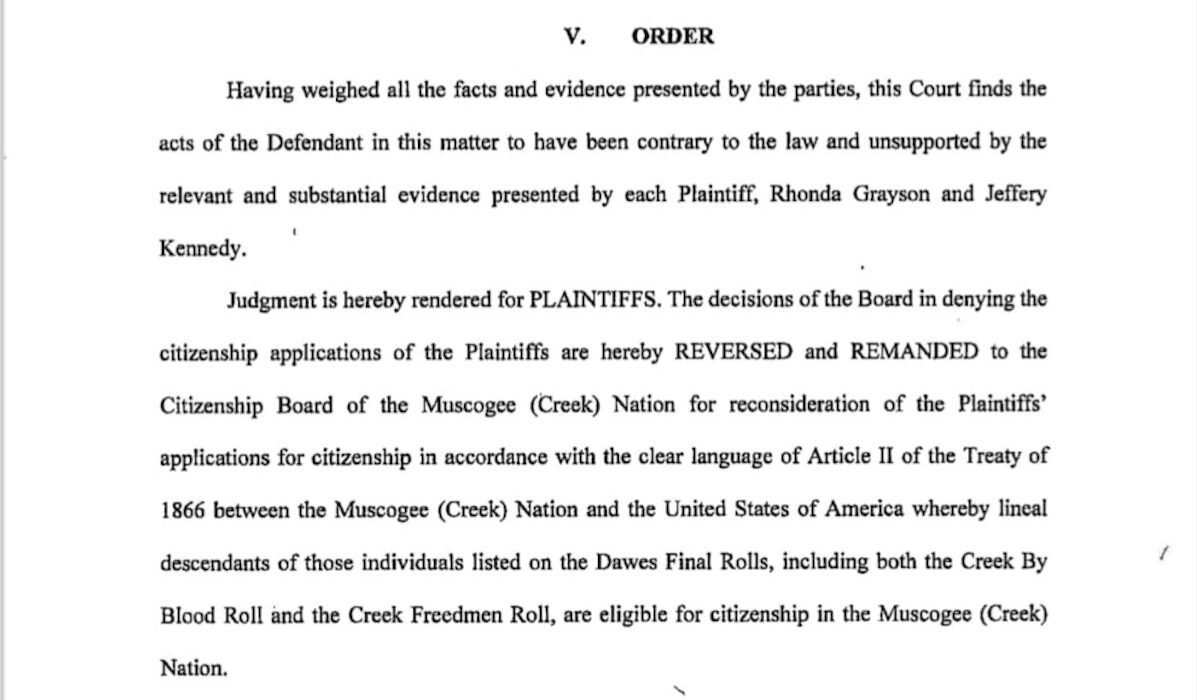
While Barnett said in her original interview that she would support a vote of the people to decide the lingering question surrounding Muscogee Freedmen citizenship, Hicks said he does not.
“Ultimately, if you set it down for a vote for the citizens of the tribe to vote on that, then you’re already saying, ‘Well our constitution might be messed up.’”
In 1979, Muscogee (Creek) Nation voters adopted a constitution that restricted tribal citizenship to descendants of people listed as “Indian by blood” on the Dawes Rolls, functionally disenrolling Freedmen citizens from the tribe. Prior to adopting that constitution, the Muscogee Nation included those listed on the Creek Freedmen Roll and the descendants of those former slaves when determining tribal citizenship.
“If you’re not by blood, then you can’t really be considered Creek or native,” Hicks said. “It would be like me saying I want to be hispanic, and I have not a single drop of hispanic blood in me.”
Hicks discusses decision to decline Mvskoke Media debate
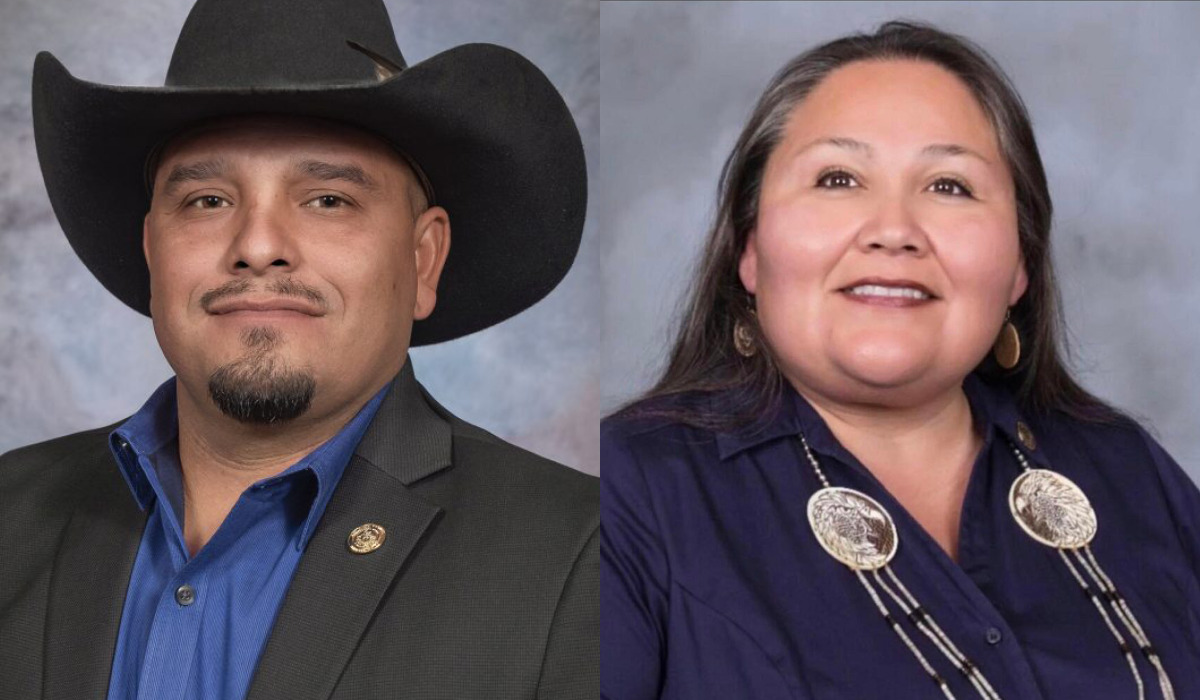
While Hicks and Barnett alike have participated in several candidate forums across the Muscogee Reservation, Hicks had not spoken to media outlets about his platform and legislative priorities prior to Friday’s conversation with NonDoc.
Hicks has not conducted a candidate interview with Mvskoke Media, the tribe’s independent and constitutionally protected news publication. Hicks also declined to participate in a debate against Barnett, proposed by Mvskoke Media, because he said Barnett took part in one of the outlet’s strategic planning meetings.
On Oct. 21, Hicks posted a screenshot of an email he sent to Mvskoke Media on Oct. 17, explaining his reason for declining the debate invitation.
“Unfortunately, I will not be participating in the debate. My opposing candidate, Dode Barnett, was recently a participant in Mvskoke Media’s strategic planning meeting and could possibly have an unfair advantage of the debate questions,” Hicks said. “Although Ms. Barnett is a Muscogee citizen, I feel it is improper for her to be involved in Mvskoke Media and that meeting, and she is not a Mvskoke Media board member, nor an employee of the nation, but a political candidate at this time.”
The Creek District seat for which Hicks and Barnett are running includes Sapulpa and Bristow, but all registered voters in the Muscogee Nation are allowed to vote in each Tribal Council race. Beyond the Hicks and Barnett matchup, the only other race on this year’s general election ballot is between incumbent Tribal Council Speaker William Lowe and challenger Robyn Whitecloud.
On Election Day, in-person voting runs from 7 a.m. to 7 p.m. on Saturday, Nov. 4.










